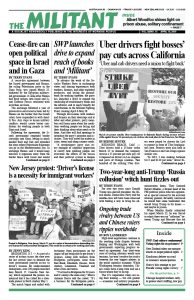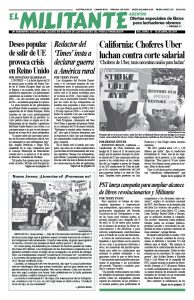Working people and other supporters of democratic rights are standing up to attempts to undermine a popular victory for the voting rights of ex-prisoners in Florida. Amendment 4 to the state Constitution, which passed by 64.6 percent last November, restores these rights to more than a million people released after serving time on felony convictions.
Newly elected Republican Gov. Ron DeSantis, who won with less than 50 percent of the vote, announced after the election that the legislature needed to pass “implementing language.” He hoped to restrict the effect of the amendment.
The amendment states that voting rights for those convicted of felonies shall be restored “after they complete all terms of their sentence including parole or probation,” except for those “convicted of murder or sexual offenses.”
Before the amendment passed, regaining the right to vote was at the whim of the governor. For all but a small number of ex-prisoners this meant they were permanently denied the right to vote.
Most working people, whatever their skin color or nationality, backed the amendment because they know there is nothing “just” about the so-called criminal justice system. Many have done time themselves, whether “guilty” or not, or have friends or relatives who have. Most are well aware that it affects all working people, while disproportionately falling on those who are Black.
The governor and some of his allies in the Florida Assembly and Senate are pushing for a new law that would prevent ex-prisoners from regaining the right to vote unless they have paid off every penny of outstanding court costs and other financial obligations, including restitution judgments and civil penalties. They also want to change the definition of murder to include attempted murder and to rewrite the definition of sexual offenses to include prostitution. This would prevent tens of thousands from being able to vote.
Coral Nichol, 40, told a state Senate committee March 25 that she owes $190,000 in restitution after serving four years in prison and 10 on probation for grand theft. Under her court-approved restitution plan, she pays $100 a month. If the Senate plan is signed into law, she won’t be eligible to vote for 190 years.
Some opponents of the proposed restrictions called the Republican-sponsored plan a “poll tax,” a reference to the days before the overthrow of Jim Crow segregation when Blacks and poor Caucasian workers were blocked from voting by a tax levied on anyone who wanted to cast a ballot. Poll taxes were banned with passage of the 24th Amendment to the U.S. Constitution in 1964.
After an outcry, the bill’s sponsors have made changes to ease some of the most egregious proposed restrictions. None of the bills have come to a vote before the Assembly or the Senate yet.
Protesters rally at state Capitol
Several hundred people, many former prisoners, rallied by the state Capitol in Tallahassee March 12 to defend Amendment 4.
Neil Volz, treasurer of the Florida Rights Restoration Coalition, told the rally they are fighting for “full implementation” of the amendment and more.
“There’s a huge challenge trying to re-enter society and it involves trying to get a job, get a license and the ability to be hired by somebody,” he said, noting they would fight against the discrimination former prisoners face re-establishing their lives on the outside.
Volz said they would also be campaigning to change some of Florida’s laws that make felonies out of acts that in most states are prosecuted as misdemeanors. In Texas theft of under $1,500 is a misdemeanor, not a felony. “In Florida the threshold is $300,” Volz said.
“At first the governor was saying that nobody should register until the state passed a new law,” Cecile Scoon, first vice president of the Florida League of Women Voters, one of the groups that backed the amendment, told the Militant by phone March 30. Some former prisoners were worried that if they registered and were found ineligible they might be prosecuted for voting fraud.
But the outcry was so strong the governor had to back down. Thousands have filed to regain their voting rights.
Scoon was at the March 12 rally. She said it’s “my great pleasure” to meet former prisoners, inspired by the victory, “who say, ‘I’m going to stand up for myself.’ It’s our goal for people who have been oppressed to get their own voices.”
At least 11 other states have laws on the books as restrictive as Florida had before the amendment was passed. There are fights being waged for referenda and changes in a number of them, including in Iowa and Kentucky. In only one state, Vermont, do those convicted of felony charges retain their right to vote even while behind bars.

